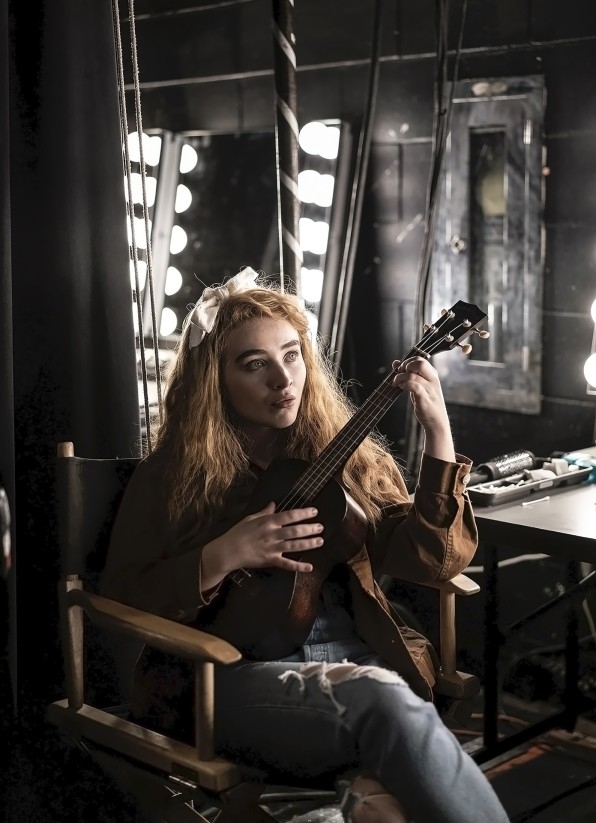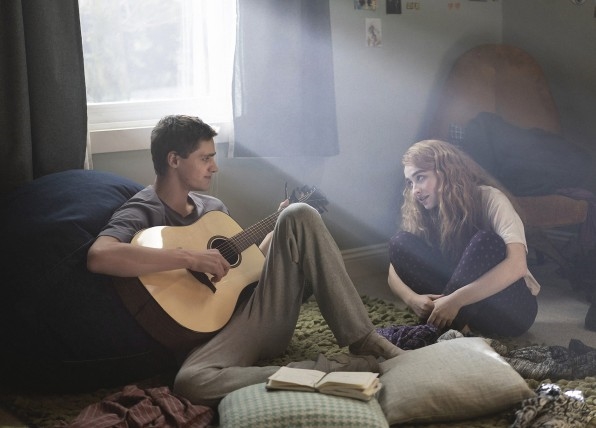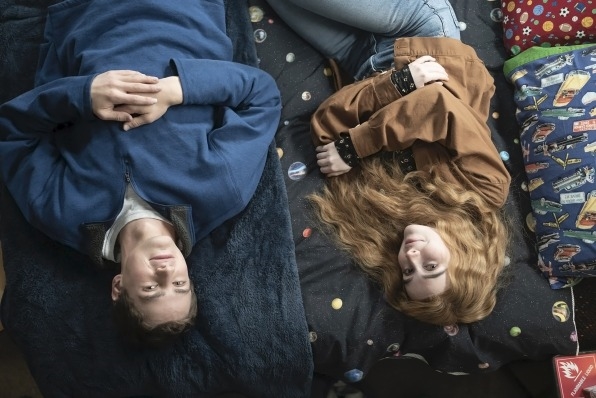Wayfarer Studios, the company behind Disney Plus’s ‘Clouds,’ makes social justice the star
On October 16, Clouds will be released on Disney Plus. The inspirational film is based on the real-life story of Zach Sobiech, a teenager who was diagnosed with a rare form of bone cancer and who chose to spend his last months chasing his musical dreams. The first narrative film to be acquired by Disney’s fledgling streaming service, Clouds reflects the sensibility of the Disney brand: uplifting and heartfelt with a family-friendly PG-13 (for strong language) rating.
But it also reflects the brand and ambitions of Wayfarer Studios, a new film and TV studio founded by Paylocity founder Steve Sarowitz and Jane the Virgin star Justin Baldoni, who directed Clouds.
Baldoni, a heartthrob actor turned filmmaker who uses his stardom as a platform to address social issues (he gave a TED talk called “Why I’m Done Trying to Be ‘Man Enough,’” which inspired a web series), first got involved in Sobiech’s story when he directed a documentary short about the teen. The film, My Last Days, was released in 2013 on the digital platform Soul Pancake, where it was watched over 15 million times. (It went on to become a docuseries on the CW.)
The success of My Last Days opened up Baldoni’s eyes to the idea that there was a market for impactful, message-driven storytelling and that audiences were “craving more meaningful content,” as he puts it. To serve that audience, Baldoni established the production company Wayfarer Entertainment, the banner behind his feature-length directorial debut, Five Feet Apart, a romance about a teenager with cystic fibrosis, which was released by CBS Films.
Wayfarer Studios is an extension of that production company, but with far bigger ambitions. Beyond just creating content with a message, Baldoni and Sarowitz want to upend the traditional studio model by building a company that puts equity and social justice at the forefront. This means hiring executives, creators, and behind-the-scenes filmmakers who reflect the diverse world we live in—i.e., more women and people of color than is typical at most Hollywood companies—and establishing a creator-friendly environment where writers and directors share in the success of the studio. They also want to open up opportunities for people for whom Hollywood is not an obvious career path through internship and scholarship programs.
“Together we have a vision to disrupt for good,” Baldoni says. “In the sense that everything we do has to fall in line with what we believe at Wayfarer could be, essentially, good for humanity.”

This means films such as Clouds as well as a movie based on Colleen Hoover’s novel It Ends With Us, about a young woman who stays in an abusive relationship. There’s also a project about the life of Ron McNair, the African American astronaut and physicist who was killed in the 1986 space shuttle Challenger launch. These and other film, TV, and digital projects will be backed by a $25 million content fund. The budgets for films will fall in the $2 million to $15 million range, but Baldoni stresses that he wants to pursue projects that aren’t just earnest and good for you but commercial, too. As he says, “If nobody sees it, then that defeats the purpose of why we’re making it.”
Other studios, of course, have waved the creator-friendly banner before, to varying levels of success. Most famously, there was United Artists. More recently, DreamWorks was formed in the mid-1990s by Steven Spielberg, Jeffrey Katzenberg, and David Geffen, which ultimately was unable to sustain itself as an independent studio. But Baldoni and Sarowitz believe that the state of the world today—between a global pandemic and racial unrest—has created an environment that has never been in more need of a purveyor of hopeful stories that serve to unite audiences. “We need hope. We need stories that inspire us,” Baldoni says. “That help us unwind and help us unlearn the systemic racial biases that we have.”
“It’s not utopian,” he goes on. “It’s just, honestly, let’s be real. There is nothing new here. This is not revolutionary. It shouldn’t even be disruptive. That’s how low the bar is. All we’re trying to do is be decent human beings in a business that makes content. And we believe that through that process, every deal we do, every friend we make in the business—they might then go and treat someone else differently too. Maybe they’ll be inspired by the way we do things.”

A Baha’i Bond
Wayfarer’s ethos is informed by Baldoni’s own experience as an actor and filmmaker in Hollywood who’s seen his share of unfavorable deal-making, as well as by the teachings of the Baha’i faith, which both he and Sarowitz practice.
Indeed, Baha’i is what brought them together in the first place.
They were introduced when Sarowitz was dabbling in Hollywood as an executive producer of a documentary about Baha’i called The Gate. A professional friendship was born in which Baldoni would advise Sarowitz on “how to not overspend when you make a documentary,” Baldoni says, and Sarowitz gave Baldoni tips on his business plan for Wayfarer Studios when Baldoni was putting it together.
When Sarowitz said he wanted to opt in to the company as an investor and partner, Baldoni first vetted the tech billionaire’s inner character.
“I said, ‘Justin, I want to become your business partner,’ and Justin tells me, ‘No, my company’s not for sale,’” Sarowitz recalls. “Then he started grilling me. He wanted to know on a very deep level what were my values. Who was I as a person, and did our values match? That was more important to him than my money.”
This introspection affects the type of projects that Wayfarer is pursuing as well as who is hired to make them. For example, when the company optioned Hoover’s It Ends With Us, Baldoni signed on to direct the film. But after considering the subject matter and who would be most suited for it, he stepped off. “I realized this is a much more important project for a woman to direct,” he says.
“And that’s how we’re looking at everything that we’re doing. Which is: What’s best? What’s best for this particular story? Because, look, as a man, I can love this story. And I can believe in it and tell it. But I shouldn’t be the one to tell it. And that’s also okay. That’s what I mean about coming from a place of abundance and love versus a small place of fear and scarcity. It’s gotta be what’s best for the project.
“There’s a chance I could be in it” as an actor, he adds chuckling, “but that’s for another article.”
Similarly, Sarowitz says that the Ron McNair project should be made by a person of color, who would best be able to identify with McNair. He hopes the film will project an image of a Black hero that veers from the typical narrative of a Black superstar athlete or musician. “We want to have that image out there,” he says. “There’s a tendency to paint people in a certain light . . . I believe that we need to break that.”

Finding Silver Linings
The Paylocity founder likes to say that “calamities can actually be providential.” When the calamity of COVID-19 struck earlier this year, Wayfarer found a way to uncover a silver lining. The company created the Six Feet Apart competition, in which five aspiring filmmakers were selected and given $50,000 each to make their first movie at home. They were each paired with an experienced filmmaker to help them navigate the project.
Now Wayfarer is in production on the contestants’ (low-budget) movies.
“It’s an example of, how do you reach out to a community?,” Baldoni says. “None of [the filmmakers] have agents. None of them have managers. But they’re talented, and we helped them on their first film because we want to be a place for these types of filmmakers and talent.
“So from top to bottom, everything we’re thinking about is, how can we build capacity? We feel this industry is so much about taking. ‘What do you have to offer me?’ Your relevance is capital. At Wayfarer Studios, we really believe that the creators are their capital.”
Beyond these sorts of experiments, Baldoni says that he and Sarowitz are discussing programs and initiatives to “create situations and opportunities for people of color that have dreams to make it in Hollywood and that maybe come from lower-income communities. It could be scholarships or internships or maybe we actually house people” in Los Angeles.

Not Hiring Who’s in Front of You
At this point, Wayfarer is still in its infancy, and many of its lofty benchmarks have yet to be realized. The company has hired a president of production and development (Andrew Calof, formerly of Amblin) but is still filling out its ranks. There is talk of one day establishing a campus with soundstages and state-of-the-art technology, but for the moment those are dreams.
Yet as the company grows, Baldoni and Sarowitz are paying close attention to how exactly it does that.
In terms of hiring executives, Sarowitz says his experience in the tech world has made him realize the danger of simply “hiring who’s in front of you from your network.”
Because those people “tend to be white males,” he says. “Over the last few years, in all my businesses, in my hiring practices, I’ve been looking to diversify. And you have to almost put your finger on the scale and say, ‘Okay, I’m going to look for people of color in high-level positions and really integrate the organization from the top down. We’re doing that at Wayfarer.
“We don’t want to just check the box and hire a person of color. I’m going to find superstars who happen to be persons of color. People who are going to add to our team, who are going to move with our team, who share our ethos, but who have a little bit of a different point of view. Not only people of color but women. Essentially, our goal is to make our company look on the inside and feel on the inside and most importantly be on the inside, what we’re talking about” with the Wayfarer brand.
Going Where Audiences Are
In the meantime, there is Clouds, another example of a journey with its own silver lining.
The film was originally set up at Warner Bros., but when the film hit a budget wall, Wayfarer came in as an investor. When COVID-19 hit, suddenly the film’s theatrical release came into question. At that point, discussions began with Disney, which acquired it for its Disney Plus streaming service.
“I did not want to wait for the theatrical release,” says Baldoni. “Right now, more than anything, people need to feel hopeful and inspired. So rather than try to get my movie into theaters and God forbid risk people getting sick or having to make some sort of choice—it was so much more important to me to meet people where they are. And I truly believe that’s the future of the business.”
Fast Company , Read Full Story
(92)



